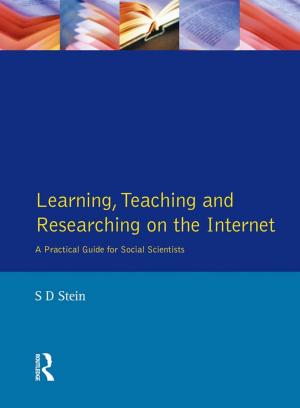Metacognition in Literacy Learning
Theory, Assessment, Instruction, and Professional Development
Nonfiction, Reference & Language, Education & Teaching, Teaching, Teaching Methods| Author: | ISBN: | 9781135606282 | |
| Publisher: | Taylor and Francis | Publication: | June 17, 2006 |
| Imprint: | Routledge | Language: | English |
| Author: | |
| ISBN: | 9781135606282 |
| Publisher: | Taylor and Francis |
| Publication: | June 17, 2006 |
| Imprint: | Routledge |
| Language: | English |
This volume provides the first comprehensive, research-based examination of metacognition in literacy learning. Bringing together research findings from reading, linguistics, psychology, and education, it is logically organized as follows: Part I provides the theoretical foundation that supports the teaching of metacognition; Parts II and III provide new methods for metacognitive assessment and instruction in literacy contexts at all grade levels; and Part IV provides new information on integrating metacognition into professional development programs.
Key features include:
*Chapter Structure. Teacher reflections at the beginning of each chapter illustrate teacher thinking about the chapter topic and metacognitive connections at the end of each chapter link its content with that of the preceding and following chapters.
*Contributor Expertise. Few volumes can boast of a more luminous cast of contributing authors (see table of contents).
*Comprehensiveness. Twenty chapters organized into four sections plus a summarizing chapter make this the primary reference work in the field of literacy-based metacognition.
This volume is appropriate for reading researchers, professional development audiences, and for upper-level undergraduate and graduate level courses in reading and educational psychology.
This volume provides the first comprehensive, research-based examination of metacognition in literacy learning. Bringing together research findings from reading, linguistics, psychology, and education, it is logically organized as follows: Part I provides the theoretical foundation that supports the teaching of metacognition; Parts II and III provide new methods for metacognitive assessment and instruction in literacy contexts at all grade levels; and Part IV provides new information on integrating metacognition into professional development programs.
Key features include:
*Chapter Structure. Teacher reflections at the beginning of each chapter illustrate teacher thinking about the chapter topic and metacognitive connections at the end of each chapter link its content with that of the preceding and following chapters.
*Contributor Expertise. Few volumes can boast of a more luminous cast of contributing authors (see table of contents).
*Comprehensiveness. Twenty chapters organized into four sections plus a summarizing chapter make this the primary reference work in the field of literacy-based metacognition.
This volume is appropriate for reading researchers, professional development audiences, and for upper-level undergraduate and graduate level courses in reading and educational psychology.















